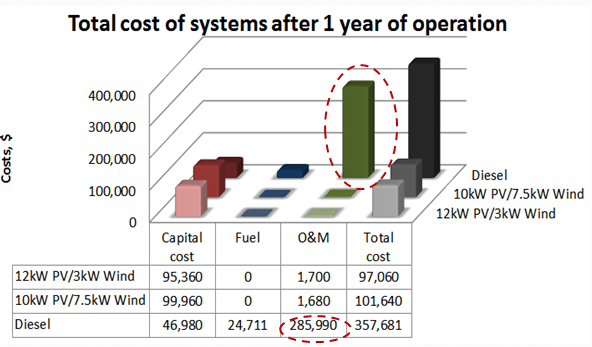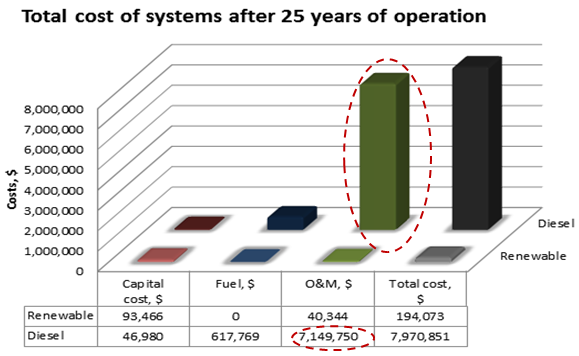




Economic Analysis
The proposed renewable hybrid system is responsible for supplying the BTS site with uninterrupted power all year round and only in exceptional cases should the use of diesel generator arise.
In order to achieve a realistic result, different sensitivity parameters were considered such as annual solar radiation average, surface roughness, annual wind speed and fuel cost.
The simulation was carried out over a period of one year.
From the simulation results it was observed that the use of solar PV panels and wind turbines were viable power supply options for BTS sites across all 12 locations scattered in Nigeria and India.
Nigeria though had a better solar resource across the 6 sites investigated, while India had both wind and solar resource as a result of extreme weather possibilities that exist.
The practical system configuration determined was:
- 8 - 12 kW PV in combination with a 7.5kW turbine for a hybrid system
- 14 kW PV (Nigeria) or 7.5 kW Wind turbine (India) for a non - hybrid system
- 48 6V Surrette batteries with a 48V DC supply
- 15 kVA Diesel generator strictly for back up
This system configuration highlighted above would be suitable for common tropical deployment of 100% clean energy for uninterruptable power performance. The battery bank at a battery state of charge SOC 100% allows a 5 day period of power supply at full load without the need to recharge before reaching a SOC of 55%. The rate of battery discharge at full load per day is 8%.
The practical system configuration suggested also benefits from excess electricity supply which allows for future network expansion and power needs.
Total net present cost (NPC), Capital cost and cost of energy (COE) for a 10kW PV and 7.5 wind turbine are $101,640, $99,960 and $0.7/kWh, respectively for one year while for a 15kVA diesel generator it is $357,681, $46,980 and $28/kWh. The detailed results are shown below for a year and 25 years operation period


Consideration:
15kVA Diesel Generators, 2.5kW Converter, 24 6V Surrette batteries, COE – $28/kWh
10kW PV and 7.5kW Wind Turbine, 48 6V Surrette batteries, COE - $0.7 /kWh
From the graphs above, It can be observed that there is an exceptionally high maintenance cost associated with the use of diesel generators especially in Nigeria. The Diesel Generator consumes about 17,700 liters of fuel per year since it is the primary source of electrical power thereby emitting 46.5 metric tons of CO2 annually per site.
With the continual rising cost of diesel oil, the costs shown above would increase in the coming years.